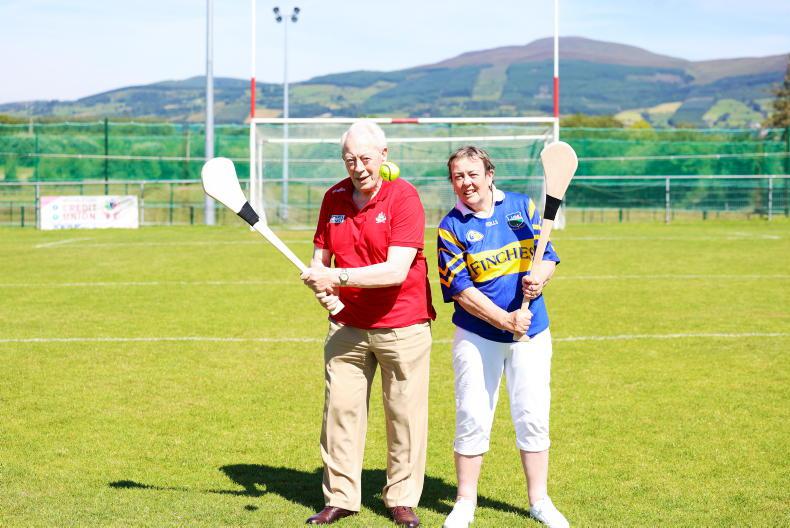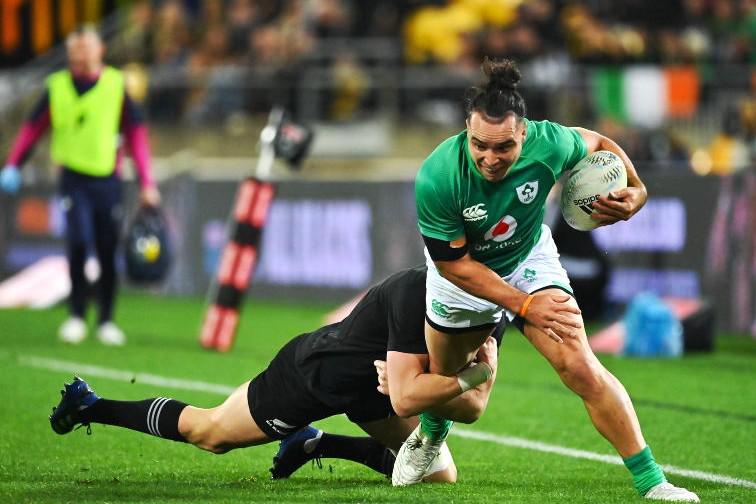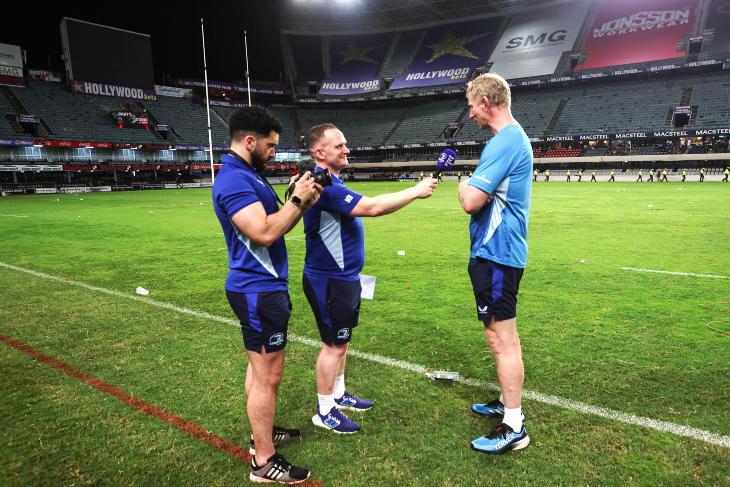Recently, I was listening to a podcast – the topic was soccer kits, don’t judge me – and one of the contributors was asked how he would rate a particular jersey out of 10.
“I rate things out of five,” he said and so the question was rephrased to suit him. Then he gave the verdict – three and a half out of five.
The need to allow for fractions has always struck us as a drawback of the five-star rating system – you’re essentially acknowledging that you need a larger scale, though it remains prevalent in reviews of the arts. Can a film or a book really only be worth zero, 20, 40, 60, 80 or 100%?
However, when it comes to the Guinness Six Nations Championship, the different levels tend to be more distinct, barring draws (three in the past decade).
To win five from five is excellent, four is good, three fair, two poor, one bad and none terrible.
In that regard, Saturday at Twickenham will essentially be the game to define the success of this year’s campaign
Thankfully, Ireland haven’t been at the bottom of the pile since the addition of Italy in 2000, but it shouldn’t be forgotten that the 1990s were a dark period for rugby in the country.
As things stand right now, the outlook is a lot brighter and there are no huge concerns for the long term, but of course the immediate landscape always understandably draws more attention.
In that regard, Saturday at Twickenham will essentially be the game to define the success of this year’s campaign.
The win against Wales was impressive; the loss in Paris was disappointing but not debilitating; the victory at home to Italy was inevitable but sloppy.
They have played better than Eddie Jones’s side have so far
Those three games add up to Ireland being well in contention for a championship win ahead of the final two matches, away to England and at home to Scotland, but a lot can happen between now and the end of the schedule.
Going on form, Ireland will be the favourites going to London.
They have played better than Eddie Jones’s side have so far – England lost to Scotland in their opener, had a facile win over Italy and then held off a Wales team that waited until the second half to start playing properly – but that can’t be taken as a reliable indicator of how the game will go.
Ireland takes glory in the opportunity to trip England up – literally, in the case of Peter Stringer on Jason Robinson in the delayed 2001 clash at Lansdowne Road, when the visitors were denied a grand slam, something that also occurred at Aviva Stadium in 2017. Matches in Twickenham are always trickier, though – the grand slam year of 2018 saw Ireland’s only victory there since 2010 – while the status of ‘overdogs’ tends not to suit our national psyche.
Changing such a culture has been part of the Irish rugby project as the professional era has matured but, while we are better in this regard, the cast-iron self-belief to go to London as favourites and win convincingly has yet to be seen.
This will be as good a chance as any, with England’s focus on being ready for the World Cup in France next year meaning they are a side in transition, especially given that captain and talisman Owen Farrell is injured. Even so, you can be sure that Jones won’t allow the fact that they are behind Ireland in their development to be an excuse.
The statistics for the first three rounds threw up some interesting figures, not least the fact that Ireland had the highest number of handling errors
Ultimately, Ireland can’t worry about England and must just focus on getting the best out of themselves. The statistics for the first three rounds threw up some interesting figures, not least the fact that Ireland had the highest number of handling errors.
That might not seem to chime with their results but it can be looked at from the point of view of ambitious moves just failing to come off. The risk-reward value is high and supporters tend to be more receptive to that approach than a safety-first slow march up the field. Against that, Ireland’s average ruck speed has been the best of the six sides in the competition.
Andrew Porter played a key part in that and will be a loss, but there are no longer any depth issues – even at out-half, where Joey Carbery deputised well for Jonathan Sexton in the last two games.
When it boils down to it, the terms of engagement are quite simple: win and Ireland will go into the last match with a shout. We’re loathe to say they should win as ‘should’ is such a subjective word, but they certainly can win and doing so would underline their progress.
Referees’ decisions: is it one rule for the league and another for the championship?
One of the blights on modern hurling has been the growing frequency with which the ball is transferred by hand with a throw.
Every team does it and you can understand why, to a degree – the fraction of a second gained can have exponential benefits in terms of evading defensive pressure or creating scoring chances. If, in such a situation, the referee isn’t blowing every breaching of the rule, you’re as well off taking the chance as the benefit will generally outweigh the potential sanction.
When Cork travelled to Birr to face Offaly in mid-February, there wasn’t a single free given for an illegal handpass, but for the Rebels’ trip to Limerick a fortnight later, five were pulled by same referee, Seán Stack (three by Cork and two by the All-Ireland champions).
Speaking after that win, Cork manager Kieran Kingston noted how there was greater vigilance being applied.
“This is one of the skills of the game and there’s no doubt teams have used that to throw the ball around at times,” he said.
“Referees, I understand and we were told today that they’re clamping down on it and that’s great and it’s right that they should clamp down on it, but the challenge will be come championship – will they clamp down on it?
I think that’s frustrating from a training point of view and from a management point of view
“So is it one rule for the league and another rule for the championship? And I think that’s frustrating from a training point of view and from a management point of view – if that’s the rule, fantastic, we have no problem with it but let it be the rule for championship as well.”
Last Saturday night, Cork made it four wins from four against a Galway side without their manager Henry Shefflin following the tragic death of his brother Paul. In that game, there were four handpass frees called by referee Thomas Walsh.
It’s good that there has been greater focus on this and it will hopefully force teams to carry out the skill properly. But, as Kingston says, it would be a shame if this was merely a brief crackdown and the championship saw a return to the freewheeling ways.
Recently, I was listening to a podcast – the topic was soccer kits, don’t judge me – and one of the contributors was asked how he would rate a particular jersey out of 10.
“I rate things out of five,” he said and so the question was rephrased to suit him. Then he gave the verdict – three and a half out of five.
The need to allow for fractions has always struck us as a drawback of the five-star rating system – you’re essentially acknowledging that you need a larger scale, though it remains prevalent in reviews of the arts. Can a film or a book really only be worth zero, 20, 40, 60, 80 or 100%?
However, when it comes to the Guinness Six Nations Championship, the different levels tend to be more distinct, barring draws (three in the past decade).
To win five from five is excellent, four is good, three fair, two poor, one bad and none terrible.
In that regard, Saturday at Twickenham will essentially be the game to define the success of this year’s campaign
Thankfully, Ireland haven’t been at the bottom of the pile since the addition of Italy in 2000, but it shouldn’t be forgotten that the 1990s were a dark period for rugby in the country.
As things stand right now, the outlook is a lot brighter and there are no huge concerns for the long term, but of course the immediate landscape always understandably draws more attention.
In that regard, Saturday at Twickenham will essentially be the game to define the success of this year’s campaign.
The win against Wales was impressive; the loss in Paris was disappointing but not debilitating; the victory at home to Italy was inevitable but sloppy.
They have played better than Eddie Jones’s side have so far
Those three games add up to Ireland being well in contention for a championship win ahead of the final two matches, away to England and at home to Scotland, but a lot can happen between now and the end of the schedule.
Going on form, Ireland will be the favourites going to London.
They have played better than Eddie Jones’s side have so far – England lost to Scotland in their opener, had a facile win over Italy and then held off a Wales team that waited until the second half to start playing properly – but that can’t be taken as a reliable indicator of how the game will go.
Ireland takes glory in the opportunity to trip England up – literally, in the case of Peter Stringer on Jason Robinson in the delayed 2001 clash at Lansdowne Road, when the visitors were denied a grand slam, something that also occurred at Aviva Stadium in 2017. Matches in Twickenham are always trickier, though – the grand slam year of 2018 saw Ireland’s only victory there since 2010 – while the status of ‘overdogs’ tends not to suit our national psyche.
Changing such a culture has been part of the Irish rugby project as the professional era has matured but, while we are better in this regard, the cast-iron self-belief to go to London as favourites and win convincingly has yet to be seen.
This will be as good a chance as any, with England’s focus on being ready for the World Cup in France next year meaning they are a side in transition, especially given that captain and talisman Owen Farrell is injured. Even so, you can be sure that Jones won’t allow the fact that they are behind Ireland in their development to be an excuse.
The statistics for the first three rounds threw up some interesting figures, not least the fact that Ireland had the highest number of handling errors
Ultimately, Ireland can’t worry about England and must just focus on getting the best out of themselves. The statistics for the first three rounds threw up some interesting figures, not least the fact that Ireland had the highest number of handling errors.
That might not seem to chime with their results but it can be looked at from the point of view of ambitious moves just failing to come off. The risk-reward value is high and supporters tend to be more receptive to that approach than a safety-first slow march up the field. Against that, Ireland’s average ruck speed has been the best of the six sides in the competition.
Andrew Porter played a key part in that and will be a loss, but there are no longer any depth issues – even at out-half, where Joey Carbery deputised well for Jonathan Sexton in the last two games.
When it boils down to it, the terms of engagement are quite simple: win and Ireland will go into the last match with a shout. We’re loathe to say they should win as ‘should’ is such a subjective word, but they certainly can win and doing so would underline their progress.
Referees’ decisions: is it one rule for the league and another for the championship?
One of the blights on modern hurling has been the growing frequency with which the ball is transferred by hand with a throw.
Every team does it and you can understand why, to a degree – the fraction of a second gained can have exponential benefits in terms of evading defensive pressure or creating scoring chances. If, in such a situation, the referee isn’t blowing every breaching of the rule, you’re as well off taking the chance as the benefit will generally outweigh the potential sanction.
When Cork travelled to Birr to face Offaly in mid-February, there wasn’t a single free given for an illegal handpass, but for the Rebels’ trip to Limerick a fortnight later, five were pulled by same referee, Seán Stack (three by Cork and two by the All-Ireland champions).
Speaking after that win, Cork manager Kieran Kingston noted how there was greater vigilance being applied.
“This is one of the skills of the game and there’s no doubt teams have used that to throw the ball around at times,” he said.
“Referees, I understand and we were told today that they’re clamping down on it and that’s great and it’s right that they should clamp down on it, but the challenge will be come championship – will they clamp down on it?
I think that’s frustrating from a training point of view and from a management point of view
“So is it one rule for the league and another rule for the championship? And I think that’s frustrating from a training point of view and from a management point of view – if that’s the rule, fantastic, we have no problem with it but let it be the rule for championship as well.”
Last Saturday night, Cork made it four wins from four against a Galway side without their manager Henry Shefflin following the tragic death of his brother Paul. In that game, there were four handpass frees called by referee Thomas Walsh.
It’s good that there has been greater focus on this and it will hopefully force teams to carry out the skill properly. But, as Kingston says, it would be a shame if this was merely a brief crackdown and the championship saw a return to the freewheeling ways.









SHARING OPTIONS